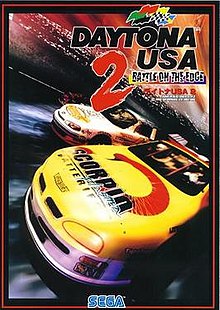|
Daytona USA 2
Daytona USA 2: Battle on the Edge (known simply as Daytona USA 2[a] in Japan), also known as Sega Racing Classic 2, is an arcade racing game released by Sega in 1998 as a follow-up to the extremely successful Daytona USA. The game featured vastly superior graphics, utilizing the Sega Model 3 hardware. The majority of Daytona USA 2 cabinets were released as deluxe models (with far fewer Twin Cabinets), which could be linked together for up to sixteen players. A notable change from the original is the ability to select a car and corresponding driver, each with varying capabilities for varying levels of player experience. Just like before, the game has three courses – Forest Dome: a beginner course with 8 laps with a distance of 1 mile (1.6 km), Joypolis Amusement Park; an advanced course with 4 laps with a distance of 2.5 miles (4.0 km), and Virtua City; an expert course with 2 laps with a distance of 5 miles (8.0 km). The 'time lap' mode also returns, and is accessed in the same manner – by holding down start at the transmission select screen. Like the original game, mirrored versions of the tracks can also be played by holding down the Start button when selecting the course. It is recommended, however, that the player has had mastery of the course beforehand. By request, an arcade operator could put the game on Grand Prix or Endurance mode to increase the number of laps in a game. Finishing a race in the top 3 in any course allows the player to view an "ending" and see the game credits. An addition to the game was the "slingshot", corresponding to advanced NASCAR drafting techniques. Originally, Daytona USA 2 was not released on home video game consoles, but was planned to be ported to Sega's Dreamcast following its launch as reported by contemporary game magazines.[2] The project was quietly cancelled and a special version of the original game, titled Daytona USA 2001, took its place as a substitute entry for the platform. 25 years after the original release of the game, Daytona USA 2 was eventually published for PlayStation, Xbox and Microsoft Windows home gaming platforms via the "Arcade" mode of Like a Dragon Gaiden (Power Edition) and Like a Dragon: Pirate Yakuza in Hawaii under the name, Sega Racing Classic 2 (lacking the official Daytona branding due to licensing).[3][4] Power EditionIn late 1998, a few months after the release of Battle on the Edge, Sega released an updated version, known as Daytona USA 2: Power Edition. Changes in this game include the environment of the beginner course; the dome and natural scenery that encircle the track in the regular release are removed, resulting in a traditional "NASCAR Oval" look, though the course layout remains the same. Also included is the "Challenge" course option, which combines the three courses altogether. Along with slightly revamped handling physics, the sponsorship on the beginner car's livery is changed. Added to Power Edition is the Hornet Classic car, the player car from the first Daytona USA, with an altered design and handling similar to that of its source game. The Hornet Classic was actually usable in Battle on the Edge, but the code to unlock it was unknown until December 31, 2020.[5] The opponent cars' AI is also more aggressive in this version, and a change is made to one corner in the Advanced course to balance out the difficulty. Before this change, many players considered this particular corner the most difficult in the game. Unusual for an arcade game, there was also an official strategy guide released in Japan. This strategy guide featured developer interviews as well as comprehensive tips and hints compiled by a group of arcade driving game professionals known as Team Marubaku.[6] The strategy guide has been out of print for a number of years and second-hand copies can command high prices.[7] The Power Edition version of the game was used as the base of the home console version of the game in 2023, included as an arcade minigame within the Yakuza spinoff game Like a Dragon Gaiden: The Man Who Erased His Name, retitled as Sega Racing Classic 2 for licensing reasons. The original version has also showed up in the 2025 game Like a Dragon: Pirate Yakuza in Hawaii. SoundtrackThe Daytona USA 2 soundtrack was composed by Fumio Ito[8] and Takenobu Mitsuyoshi, the latter being the composer of and singer on Daytona USA. Compared to the original game's soundtrack, the Daytona USA 2 soundtrack is heavier and more electric. Dennis St. James was the vocalist for all tracks with lyrics, four total. The game also has an alternate soundtrack with vocals provided by Mitsuyoshi, which can be enabled by the arcade operator. Contrary to popular belief, the band Winger did not create an entirely new soundtrack for the game or perform it as a band. Instead, the guitarist and drummer for Winger, Reb Beach and Rod Morgenstein, lent their skills to contribute to the soundtrack. Daytona USA 2's soundtrack was released in Japan on dual-disc album on July 17, 1998. The first disc contains 'original audio' tracks – that is, the course themes etc. in standard format – and 'original sound' tracks – where Tom West, commentator for the Sega Sports Channel, reports on the day's racing. These tracks are the previous course themes mixed in parts with in-game audio, such as engine noise, crashes, radio chatter from the pit crew, and so on. ReceptionIn Japan, Game Machine listed Daytona USA 2 on their August 1, 1998 issue as being the third most-successful dedicated arcade game of the month.[9] Next Generation reviewed the arcade version of the game, rating it four stars out of five, and stated that "we're happy to report that it comes completed with impressive graphics, improvements, new tracks, a level of detail that brings new sophistication to the game, and up to sixteen-player heats".[10] See alsoNotesReferences
|
||||||||||||||||||||||||||
